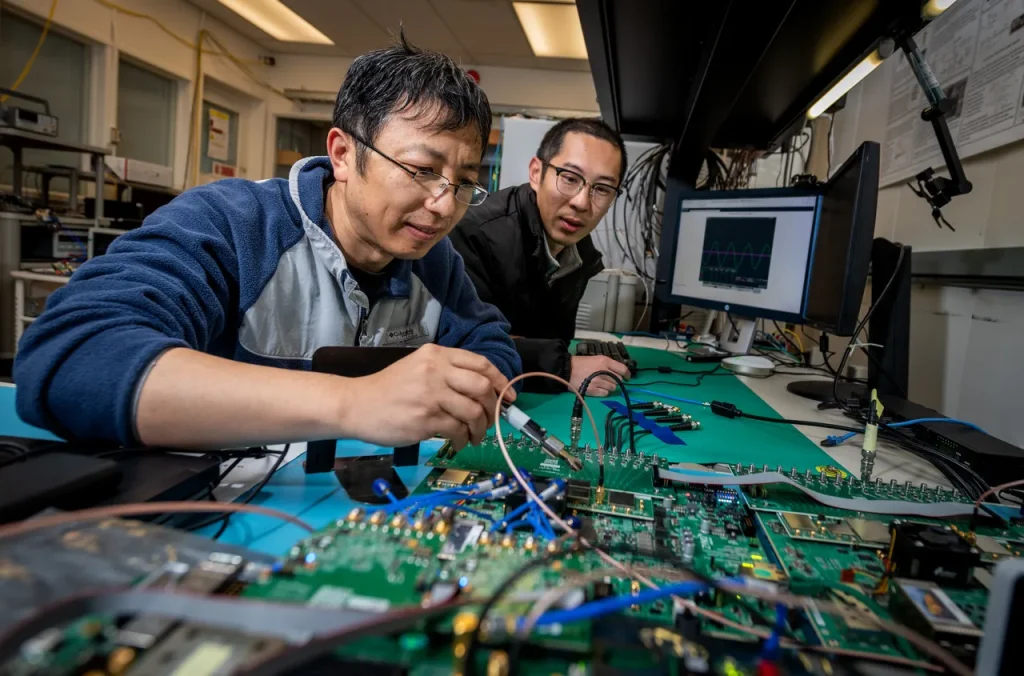Emerging Chinese Startups in Quantum Computing

Introduction
Quantum computing is emerging as one of the most transformative technologies of the 21st century, and Chinese startups are rapidly positioning themselves at the forefront of this revolution. In 2025, a new wave of startups is combining academic research with practical applications, targeting industries ranging from pharmaceuticals to finance. These ventures are supported by a growing ecosystem of venture capital, government incentives, and university-industry partnerships, allowing China to accelerate its development in quantum hardware, software, and hybrid quantum-classical solutions.
Overview of Key Startups
Several startups are gaining prominence in China’s quantum computing sector. Companies such as Origin Quantum, QuantumCTek, and SpinQ Technology have achieved significant milestones in 2025:
- Origin Quantum: Focused on developing scalable superconducting qubit architectures, Origin Quantum recently demonstrated a 64-qubit processor capable of executing complex quantum algorithms for optimization problems. The company has partnered with leading universities for joint research programs.
- QuantumCTek: Specializes in quantum communications and encryption, providing secure networking solutions for both enterprise and government applications. Their latest prototype enables high-fidelity quantum key distribution across metropolitan networks.
- SpinQ Technology: Known for its desktop quantum computing systems aimed at educational institutions and SMEs. SpinQ’s devices make quantum experimentation more accessible while training the next generation of researchers.
These startups are not only innovating in hardware but also building software platforms, developing error-correcting algorithms, and creating hybrid solutions to integrate quantum computing into existing cloud and AI infrastructures.
Funding Trends
In 2025, funding for Chinese quantum computing startups has surged. Venture capital firms and strategic investors are pouring billions into R&D, aiming to capture early market opportunities in high-performance computing and quantum-enabled AI. Government-backed initiatives, including grants and tax incentives, have further fueled growth.
Seed funding rounds typically range from $2 million to $10 million, while series A and B investments for high-potential startups can exceed $50 million. Investors are particularly interested in companies demonstrating technological proof-of-concept, intellectual property, and the potential for commercial deployment within five years.
Research Partnerships and Collaboration
Collaboration between startups, universities, and national laboratories is central to China’s quantum computing strategy. Joint research initiatives accelerate innovation, enable talent development, and provide access to specialized equipment and facilities.
For instance, Origin Quantum has partnered with Tsinghua University’s quantum research lab to co-develop superconducting qubits, while QuantumCTek collaborates with the Chinese Academy of Sciences on quantum communication protocols. These partnerships facilitate knowledge transfer, accelerate product development, and position Chinese startups as credible players on the global stage.

Technological Focus Areas
Chinese startups are concentrating on several core technological areas:
- Superconducting Qubits: Focused on stable, scalable qubits for high-performance quantum computation.
- Quantum Communication: Development of secure networks using quantum key distribution.
- Quantum Software Platforms: Algorithm development, error correction, and cloud integration.
- Hybrid Quantum-Classical Solutions: Combining classical computing infrastructure with quantum processors to solve practical problems in logistics, finance, and material sciences.
These technologies collectively enhance the practical usability of quantum systems, bridging the gap between laboratory research and real-world applications.
Economic and Industry Implications
The growth of quantum startups has broader implications for China’s economy and global competitiveness. Startups contribute to job creation in high-tech sectors, stimulate venture capital investment, and position China as a leader in next-generation computing technologies.
Industries such as pharmaceuticals, automotive, finance, and energy can benefit from early access to quantum solutions. Optimization algorithms, molecular simulations, and risk analysis powered by quantum computers could significantly accelerate product development and operational efficiency.
Challenges and Considerations
Despite rapid progress, Chinese quantum computing startups face challenges. Scaling qubit systems, managing error rates, and developing robust software solutions remain technically demanding. Talent acquisition is another critical challenge, as the field requires highly specialized expertise in physics, computer science, and engineering.
Market readiness is also a concern. While prototypes and small-scale systems demonstrate feasibility, commercial deployment at scale is still limited. Startups must balance ambitious technological goals with practical business strategies to ensure sustainable growth.
Future Outlook
Looking ahead, Chinese quantum startups are expected to continue expanding their technological capabilities, scaling up qubit systems, and building robust software ecosystems. Collaborations with international research institutions may increase, while government support ensures continued funding for innovation.
Experts predict that by 2027, Chinese startups could introduce commercially viable quantum solutions for industries such as logistics optimization, AI model acceleration, and secure communications, positioning China as a major player in the global quantum computing landscape.
Conclusion
Chinese quantum computing startups are at the forefront of technological innovation in 2025, leveraging advanced research, strategic partnerships, and substantial funding to build scalable solutions. By focusing on superconducting qubits, quantum communications, and hybrid computing, these startups are bridging the gap between theoretical research and commercial application. With continued investment, collaboration, and talent development, China’s quantum computing ecosystem is poised to influence global technology trends and establish the country as a leader in next-generation computing.






